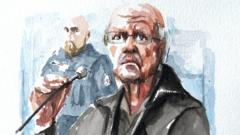The trial of former French surgeon Joel Le Scouarnec, who has admitted to sexually abusing 299 patients mostly under the age of consent, nears its conclusion with a verdict expected on Wednesday. Le Scouarnec, 74, dubbed France's most prolific paedophile, is currently serving a 15-year sentence for previous convictions related to child sexual abuse, which includes the rape of his two nieces. This latest trial, ongoing since February, may add an additional maximum penalty of 20 years to his existing sentence.
During the trial proceedings in Brittany, numerous victims provided harrowing testimonies, illustrating the profound impact of this reign of abuse on their lives. Le Scouarnec's admissions came during a closed-door session in March, where he acknowledged his guilt, stating, "I can no longer look at myself the same way because I am a paedophile and a child rapist." The surgeon admitted that many of the assaults occurred while patients were under anaesthesia or waking up from procedures. He further revealed that he kept detailed diaries of his criminal activities, which ultimately enabled authorities to identify many of the victims who previously had no recollection of the abuses.
In a harrowing reflection on his actions, Le Scouarnec expressed a lack of expectation for leniency and acknowledged his role in the trauma of victims, including the deaths of two individuals linked to the abuse. Public concern centers on the systemic failures that allowed Le Scouarnec to continue practicing medicine despite a previous conviction in 2005 for downloading child pornography.
The case has sparked protests outside the courthouse, with victims and advocates calling for societal recognition of the abuse and systemic changes within the medical field. Advocates, such as the "Victims of Joel Le Scouarnec Collective," lament the perceived indifference from both politicians and the medical community regarding this unprecedented abuse. One victim's mother, Catherine, voiced hopes for increased societal awareness and institutional accountability, emphasizing that the message must reach future generations.
Despite moments of contrition expressed by Le Scouarnec during the trial, many victims found his demeanor unconvincing. Some described his apologies as lacking sincerity, heightening demands for stricter oversight and better protections for vulnerable patients. Legal representatives for Le Scouarnec have claimed that he was sincere in his admissions, but advocates stress the need for holistic accountability, implicating the broader medical system that allowed such abuses to persist.
The National Order of Doctors (Cnom) has acknowledged failures in communication within their organization that contributed to the prolonged practice of Le Scouarnec, pledging regret over the situation. As the trial concludes, calls for justice not only focus on Le Scouarnec's punishment but also demand a reexamination of systemic lapses to protect future generations from similar predicaments.





















